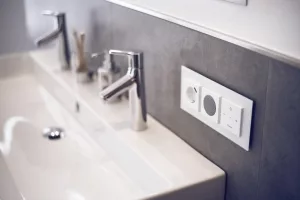High technology in the bathroom
Luxury and comfort should be ensured in the bathroom. After all, it is a place where water and electricity meet, a combination that requires special caution. Therefore, understanding safety standards, especially IP protection levels, is essential when equipping a bathroom with electrically operated appliances.
Technology trends in the bathroom are diverse and innovative. Smart showers, for example, allow water temperature and pressure to be adjusted via app or voice control, while built-in speakers provide a live music experience while showering. Other popular appliances include heated towel bars, which ensure your towels are always warm, and displays built into the mirror that show the morning news or weather. All these technologies help take the bathroom experience to a new level and make the room a central place in the modern home.
Potential dangers of electrical appliances in the bathroom
Due to its nature and use, the bathroom presents unique challenges for safety in general and for electrical appliances in particular. The Federal Statistical Office attests to this Fatal accidents occur at a higher than average rate in households where people are 55 or older.
At the heart of bathroom accidents is the omnipresent moisture. Bathing, showering, or even washing your hands can generate steam that spreads throughout the room and settles on surfaces. High humidity, along with electrical appliances, can lead to short circuits or, in the worst cases, fires.
Therefore, incorrectly placed electronic devices can quickly become a hazard in a humid environment. An example of this is a hair dryer that is too close to a water source or can fall into a full bathtub. But permanently installed appliances such as sockets and light switches must also be carefully placed and protected to avoid danger. Simple negligence, such as using a cell phone while showering, also poses risks. Anyone using technology in the bathroom should be aware of the potential risks.

Zoom in on the image
Introduction to the categories of intellectual property protection
IP protection classes play a crucial role in ensuring the safety of electrical appliances and electronics permanently installed in the bathroom. The abbreviation “IP” stands for “International Protection” and indicates how resistant the device is to external factors, especially the ingress of foreign objects and moisture.
The IP code always consists of two numbers. While the first number specifies the level of protection against foreign objects and contact, the second number represents protection against liquids. For example, an IP67-rated device is completely protected from dust and can be submerged under water for a short period without causing damage or posing a hazard. Permanently installed devices must belong to certain protection classes, as described in the article IP Protection Type and Protection Classes – Definitions, Differences and Application Examples Explained and drawn.
Knowing the IP rating and the correct choice of bathroom appliances is of great importance because it serves as a guide when deciding on safe technology in the bathroom and in other rooms as well as outdoors.
Recommendations for types of protection for bathroom electronics
The following list shows the appropriate type of protection for electrical appliances and installations.
light
In direct wet areas such as a shower, bathtub or sink, it is recommended to use lighting with a rating of at least IP65 to ensure the lights are protected from water jets. For areas outside of direct water contact, such as above a mirror, bulbs with a protection class of at least IP44 are ideal, protecting them from splashes of water.
Speakers and audio devices
When choosing bathroom speakers, you should look for devices that have at least an IP64 rating. This ensures that it is dustproof and can withstand water splashes. For speakers in the shower or near a bathtub, it is recommended to use a higher protection rating, for example IP67, to protect them from temporary submersion.
Smart technology
Smart equipment Showers must have at least an IP65 rating to protect against water jets. This is especially important because these devices are often in direct contact with water. Smart mirrors and other gadgets that are not directly exposed to water require a protection class of IP44 or higher. It is best to install devices in the bathroom that are protected at least against water splashes and at best against water jets.
Careful selection of lighting and other electronics is essential to combine safety and functionality in the bathroom without compromising design, comfort and durability.
Best practices for installing technology in the bathroom
Integrating technology into the bathroom requires more than just choosing the right IP rating. A strategic approach to installation and maintenance ensures the long service life and safety of the devices used. The following tips will help you install electronic devices safely:
- Observe minimum distances from water sources: Always maintain an appropriate distance between electronic devices and basic water sources such as shower cubicles, bathtubs and sinks. This reduces the risk of short circuits and other malfunctions or electrical problems.
- Avoid overloading the socket: Frequently used sockets can cause overheating. Multi-plugs should always be used carefully and checked for suitability for use in the bathroom.
- Regular checks and maintenance: The electrical appliances and installations in the bathroom should be checked regularly for any damage or signs of wear that are visible from the outside. If vulnerabilities are identified and fixed early, this prevents risks and also ensures that the devices last for a long time.
- Professional electrical installation: The electrical installation in the bathroom should not be carried out by amateur craftsmen, but always by qualified professional personnel. This ensures that all cables and plugs are properly insulated and placed safely and as far away from wet areas as possible.

“Certified tv guru. Reader. Professional writer. Avid introvert. Extreme pop culture buff.”






More Stories
Samsung Quantum Dot TV: Art meets technology
Pitch: €56m for energy startup Reverion
Plastoplan: Plastics for Energy Transition